

Board games are tabletop games that typically use pieces. These pieces are moved or placed on a pre-marked game board (playing surface) and often include elements of table, card, role-playing, and miniatures games as well.
Many board games feature a competition between two or more players. To give a few examples: in checkers (British English name 'draughts'), a player wins by capturing all opposing pieces, while Eurogames often end with a calculation of final scores. Pandemic is a cooperative game where players all win or lose as a team, and peg solitaire is a puzzle for one person.
There are many varieties of board games. Their representation of real-life situations can range from having no inherent theme, such as checkers, to having a specific theme and narrative, such as Cluedo. Rules can range from the very simple, such as in snakes and ladders; to deeply complex, as in Advanced Squad Leader. Play components now often include custom figures or shaped counters, and distinctively shaped player pieces commonly known as meeples as well as traditional cards and dice.
The time required to learn or master gameplay varies greatly from game to game, but is not necessarily related to the number or complexity of rules; for example, chess or Go possess relatively simple rulesets but have great strategic depth.
History
Further information: History of gamesAncient
Classical board games are divided into four categories: race games (such as pachisi), space games (such as noughts and crosses), chase games (such as hnefatafl), and games of displacement (such as chess).
Board games have been played, traveled, and evolved in most cultures and societies throughout history. Several important historical sites, artifacts, and documents shed light on early board games such as Jiroft civilization game boards in Iran. Senet, found in Predynastic and First Dynasty burials of Egypt, c. 3500 BC and 3100 BC respectively, is the oldest board game known to have existed. Senet was pictured in a fresco painting found in Merknera's tomb (3300–2700 BC). Also from predynastic Egypt is mehen.
Hounds and jackals, another ancient Egyptian board game, appeared around 2000 BC. The first complete set of this game was discovered from a Theban tomb that dates to the 13th dynasty. This game was also popular in Mesopotamia and the Caucasus.
Backgammon originated in ancient Mesopotamia about 5,000 years ago. Ashtapada, chess, pachisi and chaupar originated in India. Go (4th century BC) and liubo (1st century BC) originated in China. The board game Patolli originated in Mesoamerica and was played by a wide range of pre-Columbian cultures such as the Toltecs and the Aztecs. The royal game of Ur was found in the royal tombs of Ur, dating to Mesopotamia 4,600 years ago.
-
 Senet, one of the oldest known board games
Senet, one of the oldest known board games
-
 Hounds and jackals (Egypt, 13th Dynasty)
Hounds and jackals (Egypt, 13th Dynasty)
-
 Men Playing Board Games, from The Sougandhika Parinaya Manuscript
Men Playing Board Games, from The Sougandhika Parinaya Manuscript
-
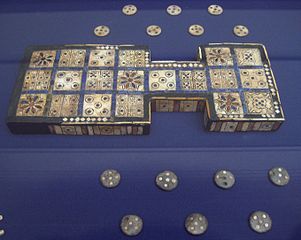 Royal game of Ur, southern Iraq, about 2600–2400 BCE
Royal game of Ur, southern Iraq, about 2600–2400 BCE
-
 Patolli game being watched by Macuilxochitl as depicted on page 048 of the Codex Magliabechiano
Patolli game being watched by Macuilxochitl as depicted on page 048 of the Codex Magliabechiano
-
 Han dynasty glazed pottery tomb figurines playing liubo, with six sticks laid out to the side of the game board
Han dynasty glazed pottery tomb figurines playing liubo, with six sticks laid out to the side of the game board
Europe
Further information: Eurogame § HistoryBoard games have a long tradition in Europe. The oldest records of board gaming in Europe date back to Homer's Iliad (written in the 8th century BC), in which he mentions the Ancient Greek game of petteia. This game of petteia would later evolve into the Roman ludus latrunculorum. Board gaming in ancient Europe was not unique to the Greco-Roman world, with records estimating that the ancient Norse game of hnefatafl was developed sometime before 400 AD. In ancient Ireland, the game of fidchell or ficheall, is said to date back to at least 144 AD, though this is likely an anachronism. A fidchell board dating from the 10th century has been uncovered in Co. Westmeath, Ireland.
In the United Kingdom, association of dice and cards with gambling led to all dice games except backgammon being treated as lotteries by dice in the Gaming Acts of 1710 and 1845. Early board game producers in the second half of the eighteenth century were mapmakers. The global popularization of board games, with special themes and branding, coincided with the formation of the global dominance of the British Empire. John Wallis was an English board game publisher, bookseller, map/chart seller, printseller, music seller, and cartographer. With his sons John Wallis Jr. and Edward Wallis, he was one of the most prolific publishers of board games of the late 18th and early 19th centuries. John Betts' A Tour of the British Colonies and Foreign Possessions and William Spooner's A Voyage of Discovery were popular in the British empire. Kriegsspiel is a genre of wargaming developed in 19th century Prussia to teach battle tactics to officers.
-
 Achilles and Ajax playing a board game overseen by Athena, Attic black-figure neck amphora, c. 510 BCE
Achilles and Ajax playing a board game overseen by Athena, Attic black-figure neck amphora, c. 510 BCE
-
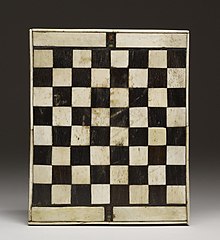 Box for Board Games, c. 15th century, Walters Art Museum
Box for Board Games, c. 15th century, Walters Art Museum
-
 An early games table desk (Germany, 1735) featuring chess/draughts (left) and nine men's morris (right)
An early games table desk (Germany, 1735) featuring chess/draughts (left) and nine men's morris (right)
-
'Game of Skittles', copy of 1660–68 painting by Pieter de Hooch in the Saint Louis Art Museum
The Americas
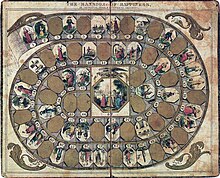
The board game Travellers' Tour Through the United States and its sister game Traveller's Tour Through Europe were published by New York City bookseller F. & R. Lockwood in 1822 and claim the distinction of being the first board games published in the United States.
Margaret Hofer described the period of the 1880s–1920s as "The Golden Age" of board gaming in America. Board game popularity was boosted, like that of many items, through mass production, which made them cheaper and more easily available.
Asia and Africa
Different traditional board games are popular in Asian and African countries. In China, Go and many variations of chess are popular. In Africa and the Middle East, mancala is a popular board game archetype with many regional variations. In India, a community game called Carrom is popular. A popular board game of flicking stones (Alkkagi) is popular in South Korea.
Modern

In the late 1990s, companies began producing more new games to serve a growing worldwide market. In the 2010s, several publications said board games were amid a new Golden Age or "renaissance". Board game venues also grew in popularity; in 2016 alone, more than 5,000 board game cafés opened in the U.S., and they were reported to be very popular in China as well.
Board games have been used as a mechanism for science communication.
Luck, strategy, and diplomacy
Some games, such as chess, depend completely on player skill, while many children's games such as Candy Land and snakes and ladders require no decisions by the players and are decided purely by luck.
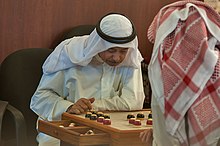
Many games require some level of both skill and luck. A player may be hampered by bad luck in backgammon, Monopoly, or Risk; but over many games, a skilled player will win more often. The elements of luck can also make for more excitement at times, and allow for more diverse and multifaceted strategies, as concepts such as expected value and risk management must be considered.
Luck may be introduced into a game by several methods. The use of dice of various sorts goes back to the earliest board games. These can decide everything from how many steps a player moves their token, as in Monopoly, to how their forces fare in battle, as in Risk, or which resources a player gains, as in Catan. Other games such as Sorry! use a deck of special cards that, when shuffled, create randomness. Scrabble does something similar with randomly picked letters. Other games use spinners, timers of random length, or other sources of randomness. German-style board games are notable for often having fewer elements of luck than many North American board games. Luck may be reduced in favour of skill by introducing symmetry between players. For example, in a dice game such as Ludo, by giving each player the choice of rolling the dice or using the previous player's roll.
Another important aspect of some games is diplomacy, that is, players, making deals with one another. Negotiation generally features only in games with three or more players, cooperative games being the exception. An important facet of Catan, for example, is convincing players to trade with you rather than with opponents. In Risk, two or more players may team up against others. Easy diplomacy involves convincing other players that someone else is winning and should therefore be teamed up against. Advanced diplomacy (e.g., in the aptly named game Diplomacy) consists of making elaborate plans together, with the possibility of betrayal.
In perfect information games, such as chess, each player has complete information on the state of the game, but in other games, such as Tigris and Euphrates or Stratego, some information is hidden from players. This makes finding the best move more difficult and may involve estimating probabilities by the opponents.
Software
Main article: Digital tabletop gameMany board games are now available as video games. These are aptly termed digital board games, and their distinguishing characteristic compared to traditional board games is they can now be played online against a computer or other players. Some websites (such as boardgamearena.com, yucata.de, etc.) allow play in real time and immediately show the opponents' moves, while others use email to notify the players after each move. The Internet and cheaper home printing has also influenced board games via print-and-play games that may be purchased and printed. Some games use external media such as audio cassettes or DVDs in accompaniment to the game.
There are also virtual tabletop programs that allow online players to play a variety of existing and new board games through tools needed to manipulate the game board but do not necessarily enforce the game's rules, leaving this up to the players. There are generalized programs such as Vassal, Tabletop Simulator and Tabletopia that can be used to play any board or card game, while programs like Roll20 and Fantasy Grounds are more specialized for role-playing games. Some of these virtual tabletops have worked with the license holders to allow for use of their game's assets within the program; for example, Fantasy Grounds has licenses for both Dungeons & Dragons and Pathfinder materials, while Tabletop Simulator allows game publishers to provide paid downloadable content for their games. However, as these games offer the ability to add in the content through user modifications, there are also unlicensed uses of board game assets available through these programs.
Market

While the board gaming market is estimated to be smaller than that for video games, it has also experienced significant growth from the late 1990s. A 2012 article in The Guardian described board games as "making a comeback". Other expert sources suggest that board games never went away, and that board games have remained a popular leisure activity which has only grown over time. Another from 2014 gave an estimate that put the growth of the board game market at "between 25% and 40% annually" since 2010, and described the current time as the "golden era for board games". The rise in board game popularity has been attributed to quality improvement (more elegant mechanics, components, artwork, and graphics) as well as increased availability thanks to sales through the Internet. Crowd-sourcing for board games is a large facet of the market, with $233 million raised on Kickstarter in 2020.
A 1991 estimate for the global board game market was over $1.2 billion. A 2001 estimate for the United States "board games and puzzle" market gave a value of under $400 million, and for United Kingdom, of about £50 million. A 2009 estimate for the Korean market was put at 800 million won, and another estimate for the American board game market for the same year was at about $800 million. A 2011 estimate for the Chinese board game market was at over 10 billion yuan. A 2013 estimate put the size of the German toy market at 2.7 billion euros (out of which the board games and puzzle market is worth about 375 million euros), and Polish markets at 2 billion and 280 million zlotys, respectively. In 2009, Germany was considered to be the best market per capita, with the highest number of games sold per individual.
Hobby board games
Some academics, such as Erica Price and Marco Arnaudo, have differentiated "hobby" board games and gamers from other board games and gamers. A 2014 estimate placed the U.S. and Canada market for hobby board games (games produced for a "gamer" market) at only $75 million, with the total size of what it defined as the "hobby game market" ("the market for those games regardless of whether they're sold in the hobby channel or other channels,") at over $700 million. A similar 2015 estimate suggested a hobby game market value of almost $900 million.
Research

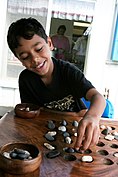 Board games serve diverse interests. Left: kōnane for studious competition. Right: kōnane for lighthearted fun.
Board games serve diverse interests. Left: kōnane for studious competition. Right: kōnane for lighthearted fun.
A dedicated field of research into gaming exists, known as game studies or ludology.
While there has been a fair amount of scientific research on the psychology of older board games (e.g., chess, Go, mancala), less has been done on contemporary board games such as Monopoly, Scrabble, and Risk, and especially modern board games such as Catan, Agricola, and Pandemic. Much research has been carried out on chess, partly because many tournament players are publicly ranked in national and international lists, which makes it possible to compare their levels of expertise. The works of Adriaan de Groot, William Chase, Herbert A. Simon, and Fernand Gobet have established that knowledge, more than the ability to anticipate moves, plays an essential role in chess-playing ability.
Linearly arranged board games have improved children's spatial numerical understanding. This is because the game is similar to a number line in that they promote a linear understanding of numbers rather than the innate logarithmic one.
Research studies show that board games such as Snakes and Ladders result in children showing significant improvements in aspects of basic number skills such as counting, recognizing numbers, numerical estimation, and number comprehension. They also practice fine motor skills each time they grasp a game piece. Playing board games has also been tied to improving children's executive functions and help reduce risks of dementia for the elderly. Related to this is a growing academic interest in the topic of game accessibility, culminating in the development of guidelines for assessing the accessibility of modern tabletop games and the extent to which they are playable for people with disabilities.
Additionally, board games can be therapeutic. Bruce Halpenny, a games inventor said when interviewed about his game, The Great Train Robbery:
With crime you deal with every basic human emotion and also have enough elements to combine action with melodrama. The player's imagination is fired as they plan to rob the train. Because of the gamble, they take in the early stage of the game there is a build-up of tension, which is immediately released once the train is robbed. Release of tension is therapeutic and useful in our society because most jobs are boring and repetitive.
Playing games has been suggested as a viable addition to the traditional educational curriculum if the content is appropriate and the gameplay informs students on the curriculum content.
Categories
There are several ways in which board games can be classified, and considerable overlap may exist, so that a game belongs to several categories.
The namesake of the board game, gameboards would seem to be a necessary and sufficient condition of the genre, though card games that do not use a standard deck of cards (as well as games that use neither cards nor a gameboard) are often colloquially included, with some scholars therefore referring to said genre as that of "table and board games" or "tabletop games", or seeing board games as a subgenre of tabletop games.
H. J. R. Murray's A History of Board Games Other Than Chess (1952) has been called the first attempt to develop a "scheme for the classification of board games". David Parlett's Oxford History of Board Games (1999) defines four primary categories: race games (where the goal is to be the first to move all one's pieces to the final destination), space games (in which the object is to arrange the pieces into some special configuration), chase games (asymmetrical games, where players start the game with different sets of pieces and objectives) and displace games (where the main objective is the capture the opponents' pieces). Parlett also distinguishes between abstract and thematic games, the latter having a specific theme or frame narrative (ex. regular chess versus, for example, Star Wars-themed chess).
The following is a list of some of the most common game categories:
- Abstract strategy games – e.g. chess, checkers, Go, reversi, tafl games, or modern games such as Abalone, Dameo, Stratego, Hive, or GIPF
- Chess variants – traditional variants e.g. shogi, xiangqi, or janggi; modern variants e.g. Chess960, Grand Chess, Hexagonal chess, or Alice Chess
- Alignment games – e.g. renju, gomoku, Connect6, Nine men's morris, or tic-tac-toe
- Auction games – e.g. Hoity Toity, Power Grid
- Configuration games – e.g. Lines of Action, Hexade, or Entropy
- Connection games – e.g. TwixT, Hex, or Havannah
- Cooperative games – e.g. Max the Cat, Caves and Claws, or Pandemic
- Count and capture games – e.g. mancala games
- Cross and circle games – e.g. Yut, Ludo, or Aggravation
- Deduction games – e.g. Mastermind or Black Box
- Dexterity games – e.g. Tumblin' Dice or Pitch Car
- Economic simulation games – e.g. The Business Game, Monopoly, The Game of Life, Power Grid, or Food Chain Magnate
- Educational games – e.g. Arthur Saves the Planet, Cleopatra and the Society of Architects, or Shakespeare: The Bard Game
- Elimination games – e.g. draughts, Alquerque, Fanorona, Yoté, or Surakarta
- Family games – e.g. Roll Through the Ages, Birds on a Wire, or For Sale
- Fantasy games – e.g. Shadows Over Camelot
- German-style board games or Eurogames – e.g. Catan, Carcassonne, Decatur • The Game, Carson City, or Puerto Rico
- Guessing games – e.g. Pictionary or Battleship
- Hidden-movement games – e.g. Clue or Escape from the Aliens in Outer Space
- Hidden-role games – e.g. Mafia or The Resistance
- Historical simulation games – e.g. Through the Ages or Railways of the World
- Horror games – e.g. Arkham Horror
- Large multiplayer games – e.g. Take It Easy or Swat (2010)
- Learning/communication non-competitive games – e.g. The Ungame (1972)
- Mancala games – e.g. Wari, Oware, or The Glass Bead Game
- Multiplayer games – e.g. Risk, Monopoly, or Four-player chess
- Musical games – e.g. Spontuneous
- Negotiation games – e.g. Diplomacy
- Paper-and-pencil games – e.g. tic-tac-toe or dots and boxes
- Physical skill games – e.g. Camp Granada
- Position games (no captures; win by leaving the opponent unable to move) – e.g. kōnane, mū tōrere, or the L game
- Race games – e.g. Pachisi, backgammon, snakes and ladders, hyena chase, or Worm Up
- Role-playing games – e.g. Dungeons & Dragons
- Roll-and-move games – e.g. Monopoly or Life
- Running-fight games – e.g. bul
- Share-buying games (games in which players buy stakes in each other's positions) – typically longer economic-management games, e.g. Acquire or Panamax
- Single-player puzzle games – e.g. peg solitaire or Sudoku
- Space games - e.g. Terraforming Mars (board game)
- Spiritual development games (games with no winners or losers) – e.g. Transformation Game or Psyche's Key
- Stacking games – e.g. Lasca or DVONN
- Storytelling games – e.g. Dixit or Tales of the Arabian Nights
- Territory games – e.g. Go or Reversi
- Tile-based games – e.g. Carcassonne, Scrabble, Tigris and Euphrates, or Evo
- Train games – e.g. Ticket to Ride, Steam, or 18xx
- Trivia games – e.g. Trivial Pursuit
- Two-player-only themed games – e.g. En Garde or Dos de Mayo
- Two-player-only abstract games - e.g. Checkers
- Unequal forces (or "hunt") games – e.g. fox and geese or tablut
- Wargames – ranging from Risk, Diplomacy, or Axis & Allies, to Attack! or Conquest of the Empire
- Word games – e.g. Scrabble, Boggle, Anagrams, or What's My Word? (2010)
Glossary
Further information: Glossary of board gamesAlthough many board games have a jargon all their own, there is a generalized terminology to describe concepts applicable to basic game mechanics and attributes common to nearly all board games.
See also
- Board game awards
- BoardGameGeek—a website for board game enthusiasts
- Going Cardboard—a documentary movie
- History of games
- Interactive movie—DVD games
- List of board games
- List of game manufacturers
- Mind sport
References
- "You can choose cities for new Monopoly game". NBC News. 20 February 2008. Retrieved 16 September 2023.
- Pritchard, D.B. (1994). The Encyclopedia of Chess Variants. Games & Puzzles Publications. p. 84. ISBN 978-0-9524142-0-9.
Chess itself is a simple game to learn but its resulting strategy is profound.
- Woods, Stewart (16 August 2012). Eurogames: The Design, Culture and Play of Modern European Board Games. McFarland. p. 17. ISBN 9780786490653.
- Livingstone, Ian; Wallis, James (2019). Board games in 100 moves. London: Dorling Kindersley. ISBN 978-0-241-36378-2. OCLC 1078419452.
- Maǧīdzāda, Yūsuf (2003). Jiroft: the earliest oriental civilization. Organization of the Ministry of Culture ans Islamic Guidance. ISBN 964-422-478-7. OCLC 249152908.
- Piccione, Peter A. (July–August 1980). "In Search of the Meaning of Senet" (PDF). Archaeology: 55–58. Archived (PDF) from the original on 25 November 2011. Retrieved 14 July 2018.
- Solly, Meilan. "The Best Board Games of the Ancient World". Smithsonian Magazine. Retrieved 27 November 2021.
- "Okno do svita deskovych her". Hrejsi.cz. 27 April 1998. Archived from the original on 8 December 2012. Retrieved 12 February 2010.
- Pivotto, Carlos; et al. "Detection of Negotiation Profile and Guidance to more Collaborative Approaches through Negotiation Games" (PDF). Archived (PDF) from the original on 9 October 2022. Retrieved 2 October 2014.
- "Games in ancient Egypt". Digital Egypt for Universities. University College, London. Retrieved 13 June 2020.
- Hirst, K. Kris. "What? Snakes and Ladders is 4,000 Years Old?". ThoughtCo.com. Retrieved 23 December 2018.
- "A 4,000-Year-Old Bronze Age Game Called 58 Holes Has Been Discovered in Azerbaijan Rock Shelter". WSBuzz.com. 18 November 2018. Archived from the original on 26 August 2019. Retrieved 23 December 2018.
- Metcalfe, Tom (10 December 2018). "16 of the Most Interesting Ancient Board and Dice Games". Live Science. Retrieved 23 December 2018.
- Bower, Bruce (17 December 2018). "A Bronze Age game called 58 holes was found chiseled into stone in Azerbaijan". Science News. Retrieved 23 December 2018.
- "Backgammon History". bkgm.com. Retrieved 17 February 2021.
- ^ Edwards, Jason R. "Saving Families, One Game at a Time" (PDF). Archived from the original (PDF) on 5 February 2016.
- ^ Brouwers, Josho (29 November 2018). "Ancient Greek heroes at play". Ancient World Magazine. Retrieved 6 March 2020.
- Schulte, Michael. "Board games of the Vikings – From hnefatafl to chess". p. 5.
- Harding, Timothy (2010). "'A Fenian pastime'? Early Irish board games and their identification with chess". Irish Historical Studies. 37 (145): 5. doi:10.1017/S0021121400000031. hdl:2262/38847. ISSN 0021-1214. JSTOR 20750042. S2CID 163144950.
- Jackson, Kenneth Hurlstone (28 February 2011). The Oldest Irish Tradition: A Window on the Iron Age. Cambridge University Press. p. 23. ISBN 9780521134934.
- Neilson, W Bryce. "GAMING HISTORY & LAW" (PDF). Gamesboard.org. Archived (PDF) from the original on 1 October 2020. Retrieved 15 February 2022.
- Kentel, Koca (Fall 2018). "Empire on a Board: Navigating the British Empire through Geographical Board Games in the Nineteenth Century". The Portolan. 102: 27–42. doi:10.17613/M6JW86M71.
- Adam, Gottfried (31 October 2022). Thumb Bibles: The History of a Literary Genre. BRILL. ISBN 978-90-04-52588-7.
- "ATour Through the British Colonies and Foreign Possessions | Betts, John | V&A Explore The Collections". Victoria and Albert Museum: Explore the Collections.
- "A Voyage of Discovery or The Five Navigators | Spooner, William | V&A Explore The Collections". Victoria and Albert Museum: Explore the Collections.
- Asbury, Susan (Winter 2018). "It's All a Game: The History of Board Games from Monopoly to Settlers of Catan" (PDF). Book Reviews. American Journal of Play. 10 (2): 230. Archived from the original (PDF) on 11 July 2020. Retrieved 5 March 2020.
- Hofer, Margaret (1 March 2003). The Games we Played: The Golden Age of Board and Table Games. Princeton Architectural Press. ISBN 978-1-56898-397-4.
- "The most popular board games in non-Western cultures". BoardGameTheories. 12 September 2020. Retrieved 1 October 2020.
- ^ Smith, Quintin (October 2012). "The Board Game Golden Age". Archived from the original on 1 June 2013. Retrieved 10 May 2013.
- "A look into the golden age of boardgames | BGG". BoardGameGeek. Retrieved 1 March 2020.
- ^ Duffy, Owen (25 November 2014). "Board games' golden age: sociable, brilliant and driven by the internet". The Guardian.
- Konieczny, Piotr (2019). "Golden Age of Tabletop Gaming: Creation of the Social Capital and Rise of Third Spaces for Tabletop Gaming in the 21st Century". Polish Sociological Review (2): 199–215. doi:10.26412/psr206.05 (inactive 1 November 2024). ISSN 1231-1413.
{{cite journal}}: CS1 maint: DOI inactive as of November 2024 (link) - "The Board Game Biz is Booming, and Chicago's Ready to Play". WTTW News. Retrieved 1 March 2020.
- "Six Reasons China Loves Board Game Cafés". Flamingo. Archived from the original on 20 May 2016. Retrieved 22 April 2016.
- Coon, Jo Thompson; Orr, Noreen; Shaw, Liz; Hunt, Harriet; Garside, Ruth; Nunns, Michael; Gröppel-Wegener, Alke; Whear, Becky (4 April 2022). "Bursting out of our bubble: using creative techniques to communicate within the systematic review process and beyond". Systematic Reviews. 11 (1): 56. doi:10.1186/s13643-022-01935-2. ISSN 2046-4053. PMC 8977563. PMID 35379331.
- "The case against Candy Land". BoingBoing. 26 January 2009.
- "Luck vs. Skill in Backgammon". bkgm.com. Retrieved 19 May 2020.
- Sfetcu, Nicolae (4 May 2014). Game Preview. Nicolae Sfetcu.
- Kirkpatrick, Karen (27 April 2015). "What's a German-style board game?". HowStuffWorks.com. Retrieved 20 July 2021.
They feature little or no luck, and economic, not military, themes. In addition, all players stay in the game until it's over.
- McLellan, Joseph (2 June 1986). "Lying and Cheating by the Rules". Washington Post. ISSN 0190-8286. Retrieved 29 December 2022.
- Glassner, Andrew (2 August 2017). Interactive Storytelling: Techniques for 21st Century Fiction. CRC Press. ISBN 978-1-040-08312-3.
- Levine, Timothy R. (20 February 2014). Encyclopedia of Deception. SAGE Publications. ISBN 978-1-4833-0689-6.
- "6 Best Sites to Play Board Games Online for Free". Mykindofmeeple.com. 25 February 2019. Retrieved 23 January 2021.
- "U3a International Chess by Email". Archived from the original on 15 October 2014. Retrieved 8 October 2014.
- "Print & Play". Boardgamegeek.com. Retrieved 8 October 2014.
- "DVD Board Games". Retrieved 8 October 2014.
- "Audio Cassette Board Games". Boardgamegeek.com. Retrieved 8 October 2014.
- Hall, Charlie (22 April 2015). "D&D now on Steam, complete with dice and a Dungeon Master". Polygon. Retrieved 10 April 2017.
- Hall, Charlie (1 December 2016). "Tabletopia is slick as hell, and it's free on Steam". Polygon. Retrieved 7 September 2017.
- "SmiteWorks USA, LLC". Fantasy Grounds. SmiteWorks. Retrieved 21 July 2017.
- O'Conner, Alice (1 October 2015). "Cosmic Encounter Officially Invades Tabletop Simulator". Rock Paper Shotgun. Retrieved 1 August 2016.
- Wawro, Alex (3 July 2015). "Mod Mentality: How Tabletop Simulator was made to be broken". Gamasutra. Retrieved 8 July 2015.
- Freeman, Will (9 December 2012). "Why board games are making a comeback". The Guardian.
- "Not Bored Of Board Games". Toyindustryjournal.com. 1 August 2018. Archived from the original on 2 March 2021. Retrieved 5 January 2021.
- Hall, Charlie (22 December 2020). "Games broke funding records on Kickstarter in 2020, despite the pandemic". Polygon. Archived from the original on 22 December 2020. Retrieved 8 August 2021.
- Scanlon, Jennifer (2001). "Board games". In Browne, Ray Broadus; Browne, Pat (eds.). The Guide to United States Popular Culture. Popular Press. p. 103. ISBN 978-0-87972-821-2.
- "So you've invented a board game. Now what?". Archived from the original on 15 November 2014. Retrieved 26 November 2014.
- "Educational Games Getting Popular". The Korea Times. 22 July 2009. Archived from the original on 5 January 2016.
- "Monopoly, Candy Land May Offer Refuge to Families in Recession". Bloomberg News. Archived from the original on 26 November 2014.
- "Chinese Board Game Market Overview". LP Board Game. Archived from the original on 21 February 2016.
- "Pamiętacie Eurobiznes? Oto wielki powrót gier planszowych, dla których oni zarywają noce". Menstream.pl. 16 April 2013. Archived from the original on 5 January 2016.
- "Monopoly Killer: Perfect German Board Game Redefines Genre". WIRED. 23 March 2009. Archived from the original on 10 May 2015. Retrieved 23 April 2015.
- Price, Erica (1 October 2020). "The Sellers of Catan: The Impact of on the United States Leisure and Business Landscape, 1995-2019". Board Game Studies Journal. 14 (1): 61–82. doi:10.2478/bgs-2020-0004.
- Arnaudo, Marco (29 November 2017). "The Experience of Flow in Hobby Board Games". Analog Game Studies. Retrieved 3 September 2023.
- "Hobby Games Market Hits $700M". icv2.com. Retrieved 3 September 2023.
- "Hobby Games Market Climbs to $880 Million". icv2.com. Retrieved 3 September 2023.
- Fernández-Vara, Clara (3 January 2014), "Adventure", The Routledge Companion to Video Game Studies: 232–240, doi:10.4324/9780203114261-33, archived from the original on 21 August 2022, retrieved 21 August 2022
- Gobet, Fernand; de Voogt, Alex; Retschitzki, Jean (2004). Moves in mind: The psychology of board games. Psychology Press. ISBN 978-1-84169-336-1.
- Simons, Daniel (15 February 2012). "How experts recall chess positions". The Invisible Gorilla. Archived from the original on 1 December 2017. Retrieved 21 November 2017.
- "Playing Linear Number Board Games—But Not Circular Ones—Improves Low-Income Preschoolers' Numerical Understanding" (PDF). Archived from the original (PDF) on 24 May 2011. Retrieved 30 May 2011.
- LeFebvre, J.E. "Parenting the preschooler" (PDF). UW Extension. Archived from the original (PDF) on 21 May 2014. Retrieved 10 March 2015.
- Lahey, Jessica (16 July 2014). "How Family Game Night Makes Kids into Better Students". The Atlantic. Retrieved 13 May 2019.
- Dartigues, Jean François; Foubert-Samier, Alexandra; Le Goff, Mélanie; Viltard, Mélanie; Amieva, Hélène; Orgogozo, Jean Marc; Barberger-Gateau, Pascale; Helmer, Catherine (2013). "Playing board games, cognitive decline and dementia: a French population-based cohort study". BMJ Open. 3 (8): e002998. doi:10.1136/bmjopen-2013-002998. ISSN 2044-6055. PMC 3758967. PMID 23988362.
- Altschul, Drew M; Deary, Ian J (2020). Taler, Vanessa (ed.). "Playing Analog Games Is Associated With Reduced Declines in Cognitive Function: A 68-Year Longitudinal Cohort Study". The Journals of Gerontology: Series B. 75 (3): 474–482. doi:10.1093/geronb/gbz149. ISSN 1079-5014. PMC 7021446. PMID 31738418.
- Heron, Michael James; Belford, Pauline Helen; Reid, Hayley; Crabb, Michael (27 April 2018). "Meeple Centred Design: A Heuristic Toolkit for Evaluating the Accessibility of Tabletop Games". The Computer Games Journal. 7 (2): 97–114. doi:10.1007/s40869-018-0057-8. hdl:10059/2886. ISSN 2052-773X.
- Heron, Michael James; Belford, Pauline Helen; Reid, Hayley; Crabb, Michael (21 April 2018). "Eighteen Months of Meeple Like Us: An Exploration into the State of Board Game Accessibility" (PDF). The Computer Games Journal. 7 (2): 75–95. doi:10.1007/s40869-018-0056-9. ISSN 2052-773X. S2CID 5011817. Archived (PDF) from the original on 9 October 2022.
- "Stealing the show". Toy Retailing News. Vol. 2, no. 4. December 1976. p. 2.
- Harris, Christopher (n.d.). "Meet the New School Board: Board Games Are Back – And They're Exactly What Your Curriculum Needs". School Library Journal. Vol. 55, no. 5. pp. 24–26. ISSN 0362-8930. Retrieved 23 April 2015.
- Mewborne, Michael; Mitchell, Jerry T. (3 April 2019). "Carcassonne: Using a Tabletop Game to Teach Geographic Concepts". The Geography Teacher. 16 (2): 57–67. Bibcode:2019GeTea..16...57M. doi:10.1080/19338341.2019.1579108. ISSN 1933-8341. S2CID 181375208.
- Woods, Stewart (30 August 2012). Eurogames: The Design, Culture and Play of Modern European Board Games. McFarland. ISBN 978-0-7864-6797-6.
- Engelstein, Geoffrey (21 December 2020). Game Production: Prototyping and Producing Your Board Game. CRC Press. ISBN 978-1-000-29098-1.
- ^ "SFE: Board Game". sf-encyclopedia.com. Retrieved 21 August 2022.
- "Arkham Horror's 3rd Edition Gives the Game a Dramatic and Awesome Overhaul - Gen Con 2018". Ign.com. 3 August 2018.
- "The Best Horror and Zombie Board Games". Ign.com. 20 December 2019.
Further reading
- Austin, Roland G. "Greek Board Games." Antiquity 14. September 1940: 257–271
- Bell, R. C. (1979) . Board and Table Games From Many Civilizations. Vol. I (Revised ed.). Dover Publications Inc. ISBN 978-0-671-06030-5.
- Bell, R. C. (1979) . Board and Table Games From Many Civilizations. Vol. II (Revised ed.). Dover Publications Inc. ISBN 978-0-671-06030-5.
- Bell, R. C. (1983). The Boardgame Book. Exeter Books. ISBN 978-0-671-06030-5.
- Falkener, Edward (1961) . Games Ancient and Oriental and How to Play Them. Dover Publications Inc. ISBN 978-0-486-20739-1.
- Fiske, Willard. Chess in Iceland and in Icelandic Literature—with historical notes on other table-games. Florentine Typographical Society, 1905.
- Gobet, Fernand; de Voogt, Alex & Retschitzki, Jean (2004). Moves in mind: The psychology of board games. Psychology Press. ISBN 978-1-84169-336-1.
- Golladay, Sonja Musser, "Los Libros de Acedrex Dados E Tablas: Historical, Artistic and Metaphysical Dimensions of Alfonso X's Book of Games" (PhD diss., University of Arizona, 2007)
- Gordon, Stewart (July–August 2009). "Saudi Aramco World : The Game of Kings". Saudi Aramco World. Vol. 60, no. 4. Houston: Aramco Services Company. pp. 18–23. Archived from the original on 20 July 2009.
- Grunfeld, Frederic V. (1975). Games of the World. Holt, Rinehart and Winston. ISBN 978-0-03-015261-0.
- Midgley, Ruth, ed. (1975). The Way to Play. Paddington Press Ltd. ISBN 978-0-8467-0060-9.
- Mohr, Merilyn Simonds (1997). The New Games Treasury. Houghton Mifflin Company. ISBN 978-1-57630-058-9.
- Murray, H. J. R. (1913). A History of Chess (Reissued ed.). Oxford University Press. ISBN 978-0-19-827403-2.
- Murray, H. J. R. (1978). A History of Board-Games other than Chess (Reissued ed.). Hacker Art Books Inc. ISBN 978-0-87817-211-5.
- Parlett, David (1999). The Oxford History of Board Games. Oxford University Press Inc. ISBN 978-0-19-212998-7.
- Pritchard, D. B. (1982). Brain Games. Penguin Books Ltd. ISBN 978-0-14-005682-2.
- Pritchard, David (1994). The Family Book of Games. Brockhampton Press. ISBN 978-1-86019-021-6.
- Rollefson, Gary O., "A Neolithic Game Board from Ain Ghazal, Jordan", Bulletin of the American Schools of Oriental Research, No. 286. (May 1992), pp. 1–5.
- Sackson, Sid (1983) . A Gamut of Games. Arrow Books. ISBN 978-0-09-153340-3.
- Schmittberger, R. Wayne (1992). New Rules for Classic Games. John Wiley & Sons Inc. ISBN 978-0-471-53621-5.
External links
| Tabletop games by type | |
|---|---|
| Board game | |
| Card game | |
| Strategy game | |
| Other | |